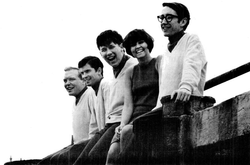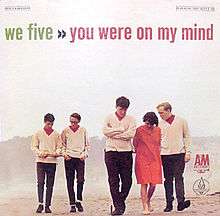We Five
We Five was a 1960s folk rock musical group based in San Francisco, California. Their best-known hit was their 1965 remake of Ian & Sylvia's "You Were on My Mind," which reached No. 1 on the Cashbox chart, #3 on the Billboard Hot 100, and #1 on the Adult Contemporary chart. The original group split after recording their second album in 1967, but a re-formed band produced three more albums between 1968 and 1977.
We Five | |
|---|---|
 We Five in 1966 | |
| Background information | |
| Origin | San Francisco, California, United States |
| Genres | Folk rock |
| Years active | 1964 - 1967; 1968 - 1970, several incarnations since then (see below) |
| Labels | A&M Records |
| Website | officialwefive |
Biography
Formation and organization

Michael Stewart formed We Five after graduating from Pomona Catholic High School and attending Mt. San Antonio College. He was the brother of John Stewart of the Kingston Trio and came from Claremont, California.[1] When Michael was a student at the University of San Francisco in 1964, he formed We Five as a quartet, although it soon added another member. The group played adult rock 'n roll, pop jazz, Broadway show tunes, and Disney tunes. Stewart did all the arrangements, which ranged from "My Favorite Things", in a style which reflected Bach, to "Very Merry Un-birthday". He put in several additional hours working on arrangements after the five band members worked together for five or six hours each day.[2]
The ensemble played acoustic guitars, electric guitar and bass and sang multi-part harmonies. The original quintet line-up, which grew out of a band called the Ridgerunners, included:
- Michael Stewart (1945–2002) (baritone-bass, 5-string banjo, 6-string acoustic guitar, 9-string amplified guitar)
- Beverly Bivens (born 1946) (low contralto to high soprano, rhythm guitar)
- Jerry Burgan (tenor, 6-string acoustic guitar)
- Pete Fullerton (tenor, acoustic and Fender bass)
- Bob Jones (1947–2013) (baritone-tenor, 6-string electric jazz guitar, 12-string electric guitar)
1965-1970
Record label A&M Records, owned by Herb Alpert, responded to the new popularity of folk and rock music by adding new artists starting in 1965 to its existing line-up of middle-of-the road material turned out by Alpert's Tijuana Brass, the Baja Marimba Band, and Brasil '66. In addition to We Five, Alpert's label released albums by Boyce and Hart, the Garden Club, Chris Montez, and The Merry-Go-Round.[3]
We Five's first album produced a major hit with the title tune, Stewart's re-arrangement of the Ian & Sylvia song "You Were on My Mind". Stewart made several changes to the original Sylvia Tyson composition,[4] and the song went directly to the Billboard Top Five in 1965. It sold over one million copies, and was awarded a gold record.[5] The group's second single was an arrangement of the popular Kingston Trio folk tune "Let's Get Together," which reached No. 31 on the Billboard Hot 100 (and was later a Top Five hit and a million-seller for The Youngbloods as "Get Together").
In February 1966, We Five was nominated for a Grammy for Best Performance By A Vocal Group (for "You Were on My Mind"), against the Beatles among others, but they lost the award to the Anita Kerr Quartet.[6] They were also the first commercial folk-rock artists to record music for Coca-Cola. The group added John Chambers as a touring drummer, so that it could tour behind its hit.[7]
After completing their second album, Make Someone Happy, later in 1966, lead singer Beverly Bivens decided to leave the group. To continue, We Five replaced Bivens with Debbie Graf Burgan (wife of guitarist Jerry Burgan) and added a full-time drummer in Mick Gillespie for live performances. That same year, the band turned down an opportunity to record John Stewart's song "Daydream Believer", which went on to be an international hit for The Monkees.
We Five was among the artists included in a preliminary injunction issued by the Los Angeles Superior Court in April 1968. The edict prohibited bootlegging of A&M artists, including the Tijuana Brass and The Sandpipers. The action was directed against Superba Tapes, Inc., of Lancaster, California. The company had copied tapes of the recordings and sold them to the public without paying royalties to the artists.[8]
The group would record two albums with Debbie Burgan singing lead, 1969's Return of the We Five for A&M and 1970s Catch the Wind for Vault. Neither album came close to the success of the earlier Bivens material. In 1970, Stewart, Jones and Fullerton all quit We Five, breaking up the original band.
Subsequent events
After We Five split up, Debbie Graf and Jerry Burgan kept a version of the group going through 1977. This group recorded another album in 1977, Take Each Day as It Comes for AVI Records before also disbanding. From 1977 through 1981, Jerry and Debbie performed as "The Burgans", supported by bassist Paul Foti.
Various versions of the band featuring the Burgans have remained together for the next 30 years. The Burgans in March 2009 contributed an original song, "For Old Times," to an online-novel-with-music-tracks entitled "Alt. Country," scheduled to appear on the website of author Alan Rifkin.[9]
Bob Jones was also a member of the current version of the band, which is now officially known as "We Five Folk Rock Revival." He died from pancreatic cancer on July 24, 2013. Later editions of the band also included Frank Denson, who went on to write music for television shows, including Magnum, P.I., Tales of the Gold Monkey, and Blossom; plus between 1968 and 1970 the drummer Mick Gillespie.[10]
Peter Fullerton left the music business in 1970 to minister to the homeless and needy: he is the founder of the California-based organization "Truck of Love".[11]
Michael Stewart appeared in occasional reunions with We Five from 1978 to 1989. He became a record producer (most notably for Billy Joel) and a pioneering developer of MIDI music software. He died on November 13, 2002 at age 57[10] as a result of "a long illness."[12] Stewart's son, musician Jamie Stewart, has alleged several times that his father in fact died by suicide, though this has been unconfirmed.[13]
In 2009, after many years of seclusion, Beverly Bivens sang at the opening of an exhibition, mounted by the Performing Arts Library & Museum in San Francisco, of the rock scene in the Bay area in the mid sixties to early seventies.
There Stands the Door - The Best of We Five was released by Big Beat Records (CDWIKD 286) in 2009. The compilation included selections from both albums plus several unreleased recordings by the original group. This collection takes its name from the We Five single which Jerry Burgan observes just missed the raga rock trend.[14]
Wounds to Bind: A Memoir of the Folk-Rock Revolution, a reminiscence by Jerry Burgan incorporating the birth of folk rock and the original band's subsequent collapse, with coauthor Alan Rifkin and a foreword by Sylvia Tyson, was published in April 2014 by Rowman & Littlefield.[15]
On June 25, 2019, The New York Times Magazine listed We Five among hundreds of artists whose material was reportedly destroyed in the 2008 Universal fire.[16]
Discography
Albums
| Year | Album | Billboard 200 | Record Label |
|---|---|---|---|
| 1965 | You Were on My Mind | 32 | A&M Records |
| 1967 | Make Someone Happy | 172 | |
| 1969 | The Return of the We Five | – | |
| 1970 | Catch the Wind | – | Vault Records |
| 1977 | Take Each Day as It Comes | – | Avi Records |
| 2009 | There Stands the Door: The Best of the We Five | – | Big Beat Records |
Singles
| Year | Title | Peak chart positions | Record Label | B-side | Album | ||
|---|---|---|---|---|---|---|---|
| US | AC | AU | |||||
| 1965 | "You Were on My Mind" | 3 | 1 | 16 | A&M Records | "Small World" | You Were on My Mind |
| "Let's Get Together" | 31 | — | — | "Cast Your Fate to the Wind" | Make Someone Happy | ||
| 1966 | "You Let a Love Burn Out" | — | — | — | "Somewhere Beyond the Sea" | You Were on My Mind | |
| "There Stands the Door" | 116 | — | — | "Somewhere" | Make Someone Happy | ||
| "The First Time" | — | — | — | "What's Goin' On" | |||
| 1967 | "High Flying Bird" | — | — | — | "What Do I Do Now?" | ||
| 1969 | "Walk on By" | — | — | — | "It Really Doesn't Matter" | The Return of the We Five | |
| 1970 | "Never Going Back" | — | — | — | Vault Records | "Here Comes the Sun" | Catch the Wind |
| 1971 | "Catch the Wind" | — | — | — | "Oh Lonesome Me" | ||
| 1973 | "Natural Way" | — | — | — | MGM Records | "Seven Day Change" | |
References
- Homecoming Due For One of Kingston Trio, March 18, 1965, pg. SG2.
- Claremont Brothers Make Music, May 9, 1965, pg. SG_A1.
- Rock Writers Show Singing Talent, Los Angeles Times, August 13, 1967, pg. C29.
- "We Five's 'You Were on My Mind', Ode to a Sometimes-Maligned Song, by Charles H. Smith". Wku.edu. Retrieved 2014-08-22.
- Murrells, Joseph (1978). The Book of Golden Discs (2nd ed.). London: Barrie and Jenkins Ltd. p. 198. ISBN 0-214-20512-6.
- "Latest Music News". MetroLyrics. Retrieved 2014-08-22.
- Chambers would later be member of the Elvin Bishop Group and The Loading Zone. His drumming talent and his contribution to We Five, both positive and negative, are discussed by Jerry Burgan in Wounds to Bind (2014).
- Court Bars Pirating Of Musical Records, Los Angeles Times, April 13, 1968, pg. B12.
- "Alan Rifkin". Alan Rifkin. Retrieved 2014-08-22.
- "We Five Folk Rock Revival, Bios". Officialwefive.com. Retrieved 2014-08-22.
- Archived August 28, 2008, at the Wayback Machine
- "Michael Stewart". Variety. November 18, 2002.
- "Xiu Xiu Shoo-Bop". Zoilus. 2004-03-11. Archived from the original on 2012-02-16. Retrieved 2012-04-10.
- "Jerry Burgan on Outsight Radio Hours". Archive.org. Retrieved 2014-08-22.
- "9780810888616 - Wounds to Bind: A Memoir of the Folk-Rock Revolution". Rowman.com. Retrieved 2014-08-22.
- Rosen, Jody (25 June 2019). "Here Are Hundreds More Artists Whose Tapes Were Destroyed in the UMG Fire". The New York Times. Retrieved 28 June 2019.
Further reading
Burgan, Jerry, with Alan Rifkin (2014). Wounds to Bind: A Memoir of the Folk-Rock Revolution. Lanham, Maryland: Rowman & Littlefield. ISBN 978-0-8108-8861-6